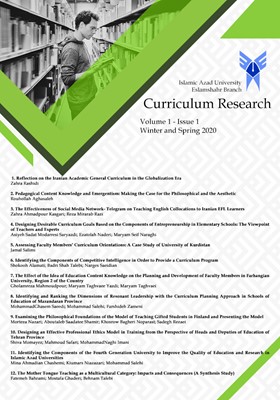Identifying the Components of the Fourth Generation University to Improve the Quality of Education and Research in Islamic Azad Universities
محورهای موضوعی : Curriculum Design and DevelopmentMina Ahmadian Chashemi 1 , Kiumars Niazazari 2 , Mohammad Salehi 3
1 - PhD Student of Educational Management, Department of Educational Sciences, Sari Branch, Islamic Azad University, Sari, Iran
2 - Professor, Department of Educational Sciences, Sari Branch, Islamic Azad University, Sari, Iran
3 - Associated Professor, Department of Educational Sciences, Sari Branch, Islamic Azad University, Sari, Iran
کلید واژه: effectiveness, Skills training, scientific-applied centers,
چکیده مقاله :
Purpose: The aim of this research was to identify the components of the fourth generation university to improve the quality of education and research in Islamic Azad universities.Methodology: This study in terms of purpose was applied and in terms of implementation method was mixed (qualitative and quantitative). The research population in the qualitative section was expert professors of educational sciences in Mazandaran province in 2019 year which according to the principle of theoretical saturation, 15 of them were selected by snowball sampling method. The research population in the quantitative section was faculty members of Islamic Azad universities of Mazandaran province in 2019 year with the number of 1487 people which according to Cochran's formula, 305 people were selected by cluster sampling method by observing the ratio of the number of faculty members in university units. For data collection in the qualitative section were used from text review and semi-structured interview and in the quantitative section were used from 83 items researcher-made questionnaire that their psychometric indices were confirmed. Data were analyzed by methods of open, axial, and selective coding and exploratory factor analysis in Maxqda2018 and SPSS-22 software.Finding: The findings of the qualitative section showed that the fourth generation university to improve the quality of education and research had 83 open codes, 16 axial codes or component and six selected codes or categories, which were included categories and components of causal conditions (with three components of scientific-social responsibility, environmental dynamics and organizational mission), contextual conditions (with three components of organizational values and structure, facilities and equipment and motivation), axial phenomenon (with one component of the role play of fourth-generation university), interventions conditions (with three components of relationship with industry, organizing educational content and library empowerment), strategies (with four components of inclusive quality management, development of fields and mutual cooperation, faculty members participation in decision-making and interaction and teamwork) and outcomes (with two components of quality of educational and quality of research). The findings of the quantitative section showed that the fourth generation university to improve the quality of education and research had 16 components were included of scientific-social responsibility, environmental dynamics, organizational mission, organizational values and structure, facilities and equipment, motivation, role play of fourth-generation university, relationship with industry, organizing educational content, library empowerment, inclusive quality management, development of fields and mutual cooperation, faculty members participation in decision-making, interaction and teamwork, quality of education and quality of research which all of them had a good factor load and they together could explain 85.37% of the total variance.Conclusion: According to the results, higher education specialists and planners can design and implement programs to improve the quality of education and research in Islamic Azad universities by promoting the components of the fourth generation university.
Alami F, Ansarifar M, Akbari S. (2020). From expectation to reality: An analysis of the quality gap between
educational and research services from the viewpoints of university students in Tehran. Journal of
Management and Planning in Educational Systems, 12(2): 295-318.
Duc NH, Chung NHT, Huy NX, et all. (2018). Towards the higher education 4.0 – characteristics and
criteria. VNU Journal of Science: Policy and Management Studies, 34(4): 1-28.
Duc NH. (2020). The third generation university in the context of the fourth industrial revolution. VNU
Journal of Science: Education Research, 36(1): 1-15.
Etuk GK. (2015). Innovations in Nigerian universities: Perspectives of an insider from a “fourth
generation” university. International Journal of Higher Education, 4(3): 218-232.
Fazel A, Kamalian A, Rowshan A. (2018). Identification of effective dimensions and components on
academic human resources empowerment, emphasizing the third and fourth generation of universities
with fuzzy Delphi approach: Presenting a conceptual model. Educational Strategies in Medical Sciences,
10(6): 455-468.
Lapteva AV, Efimov VS. (2016). New generation of university: University 4.0. Journal of Siberian Federal
University: Humanities & Social Sciences, 11(9)” 2681-2696.
Lukovics M, Zuti B. (2015). New functions of universities in century XXI towards “fourth generation”
universities. Journal Transition Studies Review, 22(2): 33-48.
Mirzaie Z, Soltani A, Motaharinezhad H. (2018). Explaining the characteristics of the third generation
university and examining their achievement in Iranian higher education: Shahid Bahonar University of
Kerman case. Research and Planning in Higher Education, 24(3): 77-106.
Nithyanandam GK. (2020). A framework to improve the quality of teaching-learning process: A case study.
Procedia Computer Science, 172, 92-97.
Oztel H. (2020). Fourth generation university: co-creating a sustainable future. In: Quality education.
Encyclopedia of the UN sustainable development goals. Cham: Springer Publisher.
Sadeghi M, Niazazari K, Taghvaie Yazdi M. (2019). The impact of virtual approach substructures on
competency based education towards fourth generation universities. Jundishapur Education
Development Journal, 10(4): 363-375.
Sepehri Y, Liaghatdar MJ, Esfijani A. (2021). Approaches and methods of teaching and learning in fourth
generation universities from the perspective of faculty members: A qualitative case study. Studies in
Learning & Instruction, 12(2): 137-161.
Yarris LM, Simpson D, Sullivan GM. (2013). How do you define high-quality education research? Journal
of Graduate Medical Education, 5(2): 180-181.
Zuti B, Lukovics M. (2017). Fourth generation universities and regional development. California: San
Francisco Publisher.


